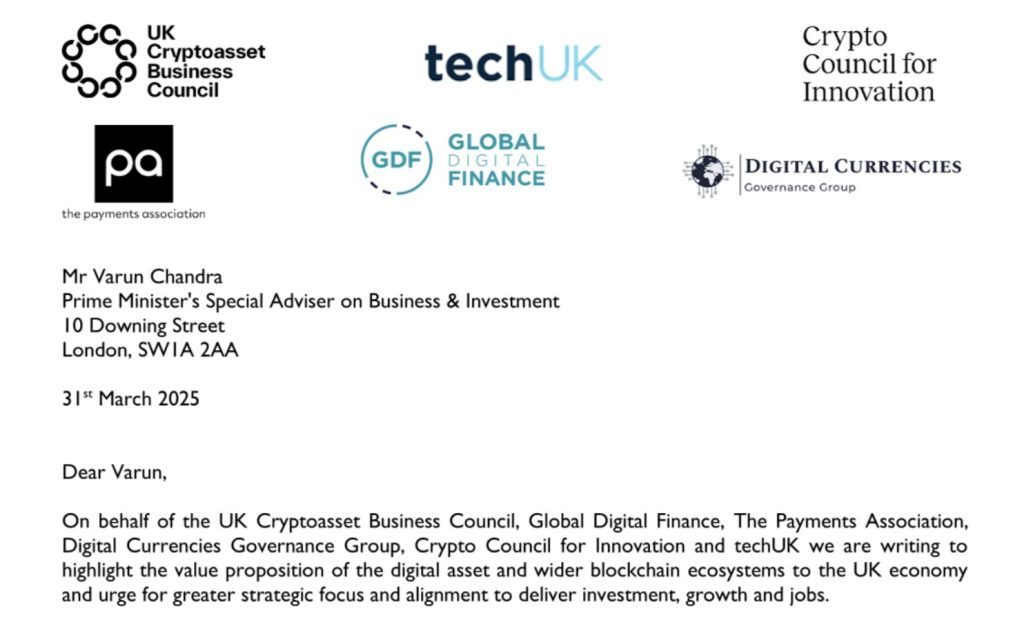Leading UK Trade Associations Urge Government to Prioritize Crypto
In a powerful move that could shape the future of the cryptocurrency landscape in the UK, a coalition of prominent trade associations has called for the government under Prime Minister Keir Starmer to take decisive action in the digital assets space. In a recent correspondence directed to Varun Chandra, Starmer’s special adviser on business and investment, six strategic organizations voiced their concerns and aspirations for the burgeoning crypto and blockchain sectors.
The call to action stems from growing recognition of the crypto industry’s potential to drive economic growth, investment opportunities, and job creation. The signatories of this influential letter include key players like the UK Cryptoasset Business Council, Global Digital Finance, The Payments Association, and techUK, among others. This coalition underscores the urgent need for a dedicated envoy for cryptocurrency as a means to enhance coordination and innovation in the sector.

Why This Matters: The UK Risks Being Outpaced
The urgency of this call to action is amplified by recent developments across the Atlantic, where former President Donald Trump championed initiatives that propelled the United States toward a more crypto-friendly environment. This includes the appointment of a “crypto czar,” a position aimed at centralizing efforts to foster blockchain innovation. The coalition warns that without similar proactive steps, the UK may fall behind jurisdictions like Dubai and Singapore, losing its competitive edge in the global fintech arena.
The letter advocates for a national action plan tailored for the crypto and blockchain sectors. This comprehensive strategy could serve as a beacon for attracting high-potential startups and projects, enhancing the UK’s appeal as a hub for digital innovation. In its proposal, the coalition also emphasizes the synergistic potential of blockchain technology, suggesting that its convergence with artificial intelligence and quantum computing could revolutionize public sector services.
Industry Insights: A Call for Collaboration
Tom Griffiths, a notable entrepreneur and co-founder of the crypto compliance firm BitCompli, shared his perspective on the coalition’s concerns via LinkedIn. He articulated that while the UK’s Financial Conduct Authority (FCA) possesses notable expertise, the current regulatory landscape is not keeping pace with advancements in other countries. “If the FCA doesn’t act now, the UK risks missing out on the long-term economic benefits this sector offers,” Griffiths cautioned.
The Economic Potential: A £57 Billion Opportunity
The implications of embracing a robust cryptocurrency framework could be monumental. Estimates suggest that the digital asset sector could potentially contribute a staggering £57 billion ($73.6 billion) to the UK economy over the next decade. Moreover, on a global scale, blockchain and cryptocurrencies are projected to add up to £1.39 trillion ($1.8 trillion) to the world’s GDP by 2030.
Current Regulatory Landscape: Progress Amidst Challenges
In a move towards clarity, the UK government recently introduced legislation aimed at defining the status of digital assets, including non-fungible tokens (NFTs) and cryptocurrencies, within the legal framework of personal property. This initiative follows a series of high-profile busts and aims to strengthen regulatory measures through the Financial Conduct Authority (FCA), which is now focused on anti-money laundering and consumer protection strategies.
Under the new rules established last year, crypto firms are mandated to register with the FCA and ensure that their marketing materials are approved by an FCA-authorized firm. These updates include essential consumer warnings about the risks associated with cryptocurrency investments, reflecting an effort to protect investors while fostering a responsible crypto ecosystem.
Future Outlook: A Call for Innovation and Action
The time for action is now. As the global landscape evolves, the coalition’s call for strategic cooperation between the government, industry, and regulatory bodies presents an invaluable opportunity for the UK to become a leader in blockchain and digital asset innovation. Investors, firms, and enthusiasts alike must engage in this conversation to shape a thriving future for digital currencies in the UK.
The potential is limitless, but it requires strong leadership and a forward-thinking approach. Will the UK rise to the challenge and secure its place in the rapidly advancing world of cryptocurrency? The answer lies in the hands of policymakers and industry leaders who can turn this vision into reality.

